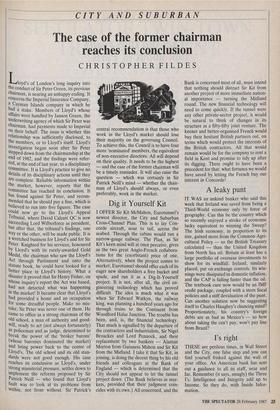Dig it Yourself Kit
I OFFER Sir Kit McMahon, Eurotunnel's newest director, the City and Suburban Cross-Channel Plan. This is to lay Con- corde aircraft, nose to tail, across the seabed. Through the cabins would run a narrow-gauge railway. The Plan, as Sir Kit's keen mind will at once perceive, gives us the two great Anglo-French collabora- tions for the (exorbitant) price of one. Alternatively, when the project comes to market, Eurotunnel should offer each of its eager new shareholders a free bucket and spade, and run it as a Dig-It-Yourself project. It is not, after all, the civil en- gineering technology which has proved difficult. The idea is much what it was when Sir Edward Watkyn, the railway king, was planning a hundred years ago for through trains to the Continent from Woodford Halse Junction. The trouble has been, and, is, the financial technology. That much is signalled by the departure of the contractors and industrialists, Sir Nigel Broackes and Lord Pennock, and their replacement by two bankers — Alastair Morton from Guinness Mahon and Sir Kit from the Midland. I take it that Sir Kit, in joining, is doing the decent thing by his old friends and colleagues at the Bank of England — which is determined that the City should not appear to let the tunnel project down. (The Bank believes in mar- kets, provided that their judgment coin- cides with its own.) All concerned, and the Bank is concerned most of all, must intend that nothing should distract Sir Kit from another project of more immediate nation- al importance — turning the Midland round. The new financial technology will need to come quickly. If the tunnel were any other private-sector project, it would be natural to think of changes in its structure as a fifty-fifty joint venture. The keener and better-organised French would buy their hesitant British partners out, on terms which would protect the interests of the British contractors. All that would remain would be for the company to rent a field in Kent and promise to tidy up after its digging. There ought to have been a precedent for that: what fortunes we would have saved by letting the French buy our interest in Concorde!


















































 Previous page
Previous page